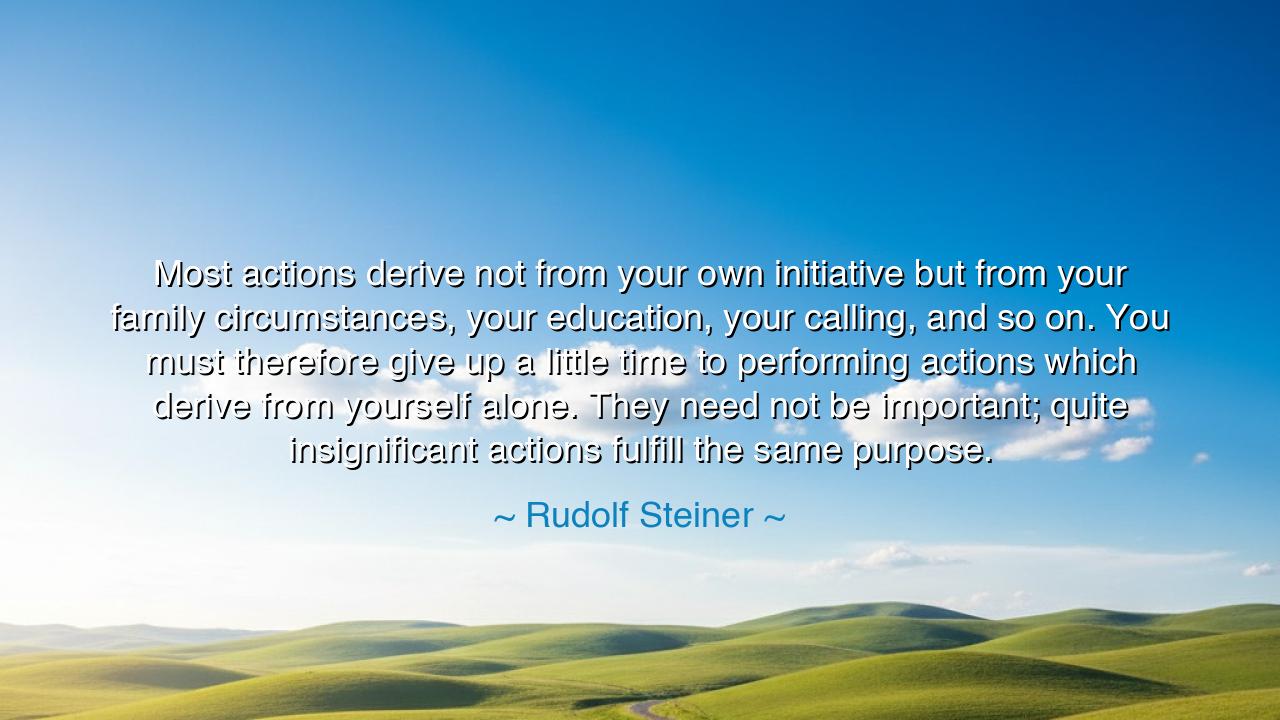
Most actions derive not from your own initiative but from your
Most actions derive not from your own initiative but from your family circumstances, your education, your calling, and so on. You must therefore give up a little time to performing actions which derive from yourself alone. They need not be important; quite insignificant actions fulfill the same purpose.






"Most actions derive not from your own initiative but from your family circumstances, your education, your calling, and so on. You must therefore give up a little time to performing actions which derive from yourself alone. They need not be important; quite insignificant actions fulfill the same purpose." These words by Rudolf Steiner reflect a profound understanding of the human condition—our lives are shaped not solely by our individual will, but by the forces around us: the family into which we are born, the education we receive, and the roles we are called to play in society. Steiner urges us to recognize that much of what we do is a response to the circumstances that surround us, rather than a true expression of our innate desires. Yet, despite this, he also encourages us to carve out time for actions that are purely our own—those that emerge from the deepest recesses of our soul and spirit, not dictated by external forces.
In the ancient world, the role of external forces shaping the individual was recognized, but the ancient philosophers also sought to illuminate the power of self-determination. The Stoics, for example, taught that while we cannot always control the circumstances of our birth, education, or even the whims of fate, we can control how we respond to these influences. Epictetus, a former slave turned philosopher, believed that true freedom came not from the circumstances around us, but from the way we choose to react to those circumstances. For Epictetus, the inner freedom lay in mastering the will, even when the world itself seemed beyond our control. Steiner’s words resonate with this Stoic principle, suggesting that while we are influenced by external forces, we must still carve out space to act from our own volition, to give birth to actions that are purely ours.
This idea also echoes the Greek concept of destiny. In Homer's Iliad, the warriors are bound by fate, their actions dictated by the will of the gods. Yet, amidst the grand forces that push the heroes toward their destinies, there remains the human spirit, which, though subject to fate, still chooses how to face the challenges presented to it. Achilles, for example, is bound to fight in the Trojan War, but it is his personal choice to withdraw from battle out of anger and later return to fight for honor. Though much of his life is shaped by external circumstances, Achilles still finds moments to act from his own desires and will, making him more than a mere pawn in the hands of the gods. Steiner reminds us of this: amidst the duties and expectations placed upon us, we must still take time for actions that stem from our deepest self.
In modern history, Albert Einstein exemplifies this idea in his early life. Born into a family that valued education and intellectual curiosity, much of his initial journey was shaped by his family circumstances and the education he received. Yet, Einstein did not simply follow the prescribed paths of his teachers or his mentors. He took time to engage in thought experiments, theoretical exploration, and questions that stemmed from his own curiosity, leading to the development of his groundbreaking theories on relativity. His contributions to science were not merely the result of following the conventions of his education, but the outcome of thinking independently—finding time to engage with ideas that were his alone. Steiner’s idea of carving out moments for self-directed action finds its embodiment in Einstein, who spent time exploring questions that were not dictated by anyone but his own inquisitive mind.
Steiner's wisdom is a call to us all to recognize that while our lives may be shaped by the external influences of family, education, and society, we must still carve out time to nurture and express our own unique voice. It is too easy to get lost in the roles we play—whether as parents, workers, students, or citizens—and forget the importance of acting from our deepest self. Just as a garden requires not just the nurturing of plants but also the space to grow new shoots, our inner life requires space to flourish. The small, seemingly insignificant actions that Steiner refers to are not trivial; they are the seeds of self-expression, and they are vital for our personal growth.
The lesson from Steiner’s words is simple yet profound: in a world that often demands conformity and obedience, we must remember to act from our own heart. Whether it is through a moment of creativity, a quiet reflection, or a choice that reflects our deepest values, we must find time to nurture actions that are ours alone. These moments may seem insignificant in the grand scheme of life, but they are the very actions that allow us to connect with our truest self and ensure that we are not simply following the paths laid out for us, but are also carving our own way forward.
In our lives, we should actively seek out time to reflect on our own desires and values. Whether through art, writing, or simple moments of quiet contemplation, let us take the time to engage in actions that come not from external pressures, but from the truths within us. These actions will not only bring us closer to our true selves but will enrich the world with the uniqueness that only we can offer. Let us remember that it is not just the grand, societal contributions that define us, but the small, self-directed acts that shape our inner lives and ultimately our legacy.






AAdministratorAdministrator
Welcome, honored guests. Please leave a comment, we will respond soon